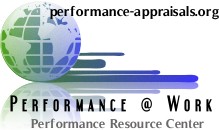Observing, Documenting Employee Performance
Gathering Data, Observing, and Documenting
Since I wrote this when writingThe Manager's Guide to Performance Reviews I have a chance to think about and clarify some of the ideas. When you are finished with this article, you really should visit "What's Important In Documenting Employee Performance, particularly if what is written below makes you feel you don't have time to follow the "book".
The next component of the performance management system is gathering data, observing, and documenting. As part of an effective performance management system, all three activities
can occur anytime during the year. Data gathering and observation are done during the year, outside the performance review meeting; documenting happens during the year and during and after the performance review meeting.
If we are going to discuss performance during performance
review meetings, we can’t do that in a vacuum. To be most
effective, performance discussions need data and substance. For example, it’s one thing to say, “Your performance is poor” and a completely different thing to say, “Last month, your production figures were down by 20% and I think we need to talk
about that.” The difference is huge.
Discussions based on vague judgments are guaranteed to create bad feelings and, even more important, are not specific enough to help employees improve. Gathering data and observing
behavior and the consequences help keep discussions focused on more concrete and specific aspects of performance.
That in turn makes it possible to work together to identify the why’s of performance—why performance may have been less than desired or why performance improved. The latter is important so both you and the employee know what worked, so it can be repeated.
Also gathering data, observing, and documenting what you’ve observed help you identify problems early on—provided you are doing these things throughout the year.
Let’s explain the meanings of “observing,” “collecting data,” and “documenting.” Observing refers to what you have seen or heard directly that relates to an employee’s performance.
Observations may be based on an employee’s actual observable behavior. For example, in a call center, monitoring calls would be observing. In sales, it might be listening to how the employee works with customers. Another example: seeing how an employee interacts with team members at meetings. Observations can also be based on the results or consequences of an employee’s behavior. For example, you might observe that at a team meeting, several members got upset when the employee used certain sexist phrases. You observe
the behavior and you observe the effects of that behavior on others. Both behaviors and consequences/results
are part of your observations. Collecting data is a little bit different. Information exists in the workplace that can indicate whether an employee is doing badly or well. That information may be in the form of data. Here are some examples:
• Dollar value of sales by the employee
• Number of complaints about the employee
• Number of customer commendations
• Days absent
• Number of creative ideas generated and implemented
This information can be extremely valuable during the performance review meetings. “Hard” data is less colored by opinion;
it’s not completely objective but it’s better than vague comments.
Therefore, it’s a little less volatile to talk about number of days absent then to
talk about the employee’s attitude.
You should collect data throughout the year, as an ongoing process, and not just a task just prior to a performance review meeting. It spreads the load a little bit and it allows you to identify
problems during the year when it’s not too late to remedy them. It’s also fairer to the employee, because the data represents the entire year and not just a short time that may not be
representative of the year.
Documentation is simply the recording of information about the employee’s performance. That happens during the year, as needed, and as a result of the interactions between you and the
employee during the performance review meeting. When documentation is done throughout the year, the primary purpose is to record important information so it won’t be lost or forgotten. For
example, you might observe a customer-employee interaction
that went badly.
Apart from dealing with it as soon as possible, you might also want to make a few notes so you can discuss the incident with the employee later on, without having to rely completely on memory.
Documentation based on the performance review meeting provides a summary, on paper, of the discussions, conclusions, and action plans that are decided upon in that meeting. Usually,
they are kept permanently in an employee’s personnel file.
